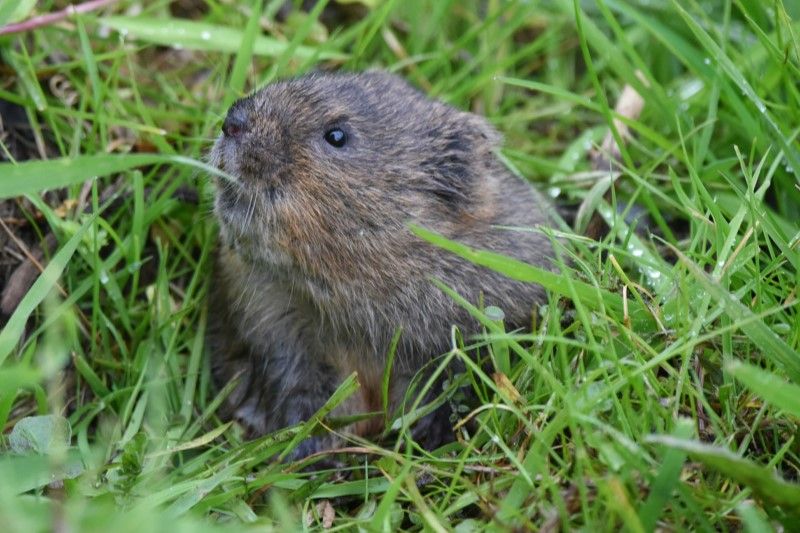- Last year, almost 800 sites across the country were surveyed and rare red squirrels, hazel dormice and water voles were spotted in parts of the UK
- 2023’s results also show an ongoing decline in records of rabbits, whose numbers have fallen by up to 50% since the survey began in 2003
- Anyone in the UK can help wildlife by taking part in PTES’ Living with Mammals survey
This spring, leading wildlife conservation charity People’s Trust for Endangered Species (PTES) is calling for volunteers across the UK to take part in its popular annual Living with Mammals survey, in a bid to track changes in our wildlife.
Volunteers are needed to record sightings of any wild mammals they see each week in their gardens, local parks or other green spaces, such as allotments and churchyards. The results enable conservationists to better understand how our environment is changing, how these changes impact wild mammal populations, which need the most help and where conservation action is needed.
Any sightings of mammals (or the signs left behind, such as footprints or droppings) are recorded online. Free advice is available to help those new to wildlife surveying, with guides on how to identify different species and recognise tell-tale signs – you don’t need to be an expert!
Any mammal, however commonly seen, provides useful data. Last year, almost 800 sites across the country were surveyed throughout the year, with over 20 different species spotted including garden regulars such as foxes and grey squirrels and well-loved species such as hedgehogs. There were also records of rarer species too, highlighting the importance of urban areas in conservation. These included; eight records of red squirrels, seen on the Isle of Wight, in Cumbria and in Dumfriesshire, Scotland, hazel dormice in the East Midlands and South West regions of England, and water voles in the South West, South East and East Midlands regions.
David Wembridge, Mammal Surveys Coordinator at People’s Trust for Endangered Species says: “With blossom on the trees, and bats and hedgehogs emerging from hibernation, spring is a wonderful time to connect with the great outdoors and get involved in conservation.”
“Taking part in Living with Mammals is a really valuable, and easy, way to help conservation. Every record – whether you spot anything or not – is crucial to understanding how different populations are changing year on year, and how we can protect them. The data from Living with Mammals contribute to major reports such as the State of Nature and the State of Britain’s Hedgehogs, and without these records we wouldn’t have such an insight into how different species are faring and how to help. Therefore it’s vital that as many people can take part as possible.”
The 2023 results also showed that sightings of rabbits have fallen markedly since Living with Mammals began in 2003. Last year, only one in ten sites surveyed reported rabbits, compared with a third of sites in the first few years of the survey. This continues the ongoing decline seen over the survey’s history, with overall numbers falling by up to 50% since 2003.
David adds: “To see rabbit numbers decline, when we think of them more typically as abundant and multiplying, is a concern. Rabbits are an important part of our natural environment, maintaining grasslands and a food source for predators and birds of prey. We need to monitor how numbers are changing and taking part in Living with Mammals is key to that.”
Living with Mammals 2024 runs from March until the end of the year. To take part, visit: ptes.org/lwm and share your photos on social media using #LivingWithMammals.
—
To take part in any of these surveys or to find out more about PTES, visit ptes.org/surveys.
– ENDS –
For high res images, interview requests or further information, please contact Adela Cragg:
T: 07532 685 614
Notes to Editors
Available for interview
- David Wembridge, Mammal Surveys Coordinator, People’s Trust for Endangered Species
About People’s Trust for Endangered Species (PTES)
- PTES, a UK conservation charity created in 1977, is ensuring a future for endangered species throughout the world. We protect some of our most threatened wildlife species and habitats, and provide practical conservation support through research, grant-aid, educational programmes, wildlife surveys, publications and public events.
- PTES’ current priority species and habitats include hazel dormice, hedgehogs, water voles, noble chafers, stag beetles, traditional orchards, native woodlands, wood pasture and parkland and hedgerows.
- PTES has Species Champions for two of its priority species: for hedgehogs The Rt Hon Chris Grayling, MP for Epsom & Ewell and for water voles The Rt Hon Hilary Benn, MP for Leeds Central and Chair of the Brexit Select Committee.
- Visit www.ptes.org and follow PTES on Facebook, Twitter, Instagram, YouTube & LinkedIn.
Header image credit Neil McIntyre

